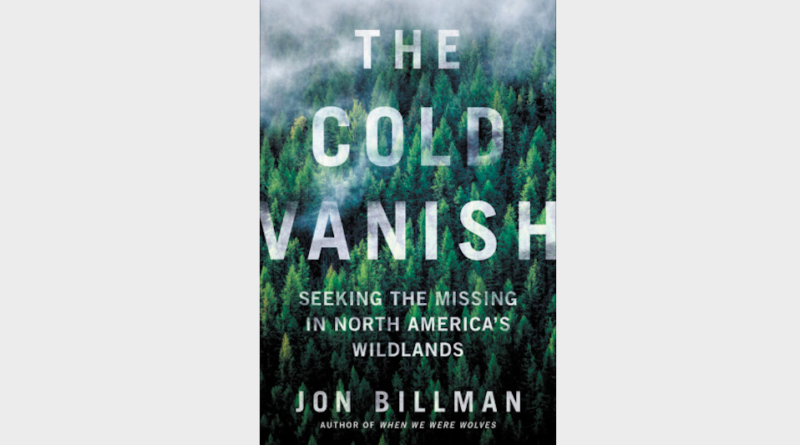REVIEW: ‘The Cold Vanish: Seeking the Missing in North America’s Wildlands’ by Jon Billman
Image courtesy of Grand Central Publishing / Photo provided by official site.
Jon Billman’s new book, The Cold Vanish: Seeking the Missing in North America’s Wildlands, is an engaging and ultimately saddening look at the many cases of missing people in national parks and other wild places. Throughout these 300-plus pages, the author focuses in on the case of Jacob Gray, who went missing a few years ago in Olympic National Park in the Pacific Northwest.
Billman has seemingly endless access to Jacob’s family, in particular the search and rescue efforts of the young man’s father, Randy Gray (although it should be noted that the entire family is devastated and dedicated to finding Jacob). The author travels with Randy over many miles, traversing the expanse between Santa Cruz, California, where the family lives, and Olympic National Park, many miles north. When the trail runs cold in the woods and rivers of the national park and neighboring national forest, Billman even heads with the desperate father to a commune on Vancouver Island, to the home of a woman who says she feeds a family of Sasquatch and a couple psychics. When the physical evidence is lacking, and there are so few answers over multiple months, Randy turns to the supernatural and the far-out-there as possible answers.
The author, to his credit, never judges Randy’s long journey to find what happened to his son. In fact, he sympathizes with the man, a kind-hearted surfer who quits his day job in Santa Cruz to search 24-7 in the wild and the surrounding communities, even living for days on end in a “Bigfoot Barn” near the park. And after a while, one realizes that the search, no matter how extensive and perhaps off the mark it becomes, is what gives Randy hope to keep going, to bravely face the growing reality of what may have happened to Jacob.
The only evidence left behind is Jacob’s bike, some supplies and four arrows stuck in the ground nearby (perhaps a sign?). These items were left near the banks of the Sol Duc River, which leads authorities to believe that he may have fallen in the nearby current and floated downstream. Randy searches everywhere in the river and along its sides, and few clues turn up.
As Billman meticulously details the search and rescue efforts — and the red tape one faces when trying to utilize dog teams and helicopters on public land — it becomes clear that although the circumstances surrounding Jacob’s disappearance are unique, they are just one example of a person who has gone missing in North America. In between the chapters detailing Jacob’s story are other sad tales about people who seemingly vanished from reality forever. The author writes about cases from Colorado to Hawaii to the far reaches of northern Canada, and everywhere in between. One would expect that the cause of many of these vanishings is simply the natural environment, be it a steep cliff or roaring river, but some of tales speak to suspicious circumstances and the pointing of fingers to possible killers in the area.
The transition between Jacob’s story and the many other “cold vanishes” is expertly crafted by the author. One keeps following along in the narrative hoping to find out more information involving Jacob’s case and also hoping to find out more details on how to contextualize this large, multi-faceted problem.
There are few detours not worth taking in The Cold Vanish. For skeptics, perhaps the chapters about Bigfoot, cults and psychics are a bit much, but Billman is not a firm believer in these theories. He simply presents the pathways that emerge when families are desperate and out of options (it should be noted: psychics are often called in for missing-person cases, but many of the predictions, at least in Jacob’s case, prove wrong). There’s also a bit too much time spent with a bloodhound trainer who tries to turn his dogs into K9 sleuths.
As to be expected when describing the many vanishings that occur in the wild, the book provides more questions than answers. Many people who go missing are simply never heard from again, and their remains are never found. This can be troubling, for sure, and also frustrating to write about, but it’s also honest and real. This is not the realm of quick answers and made-for-TV solves (although there are a few mentioned in the book, including a woman who went missing on Maui and a “mountain man” who wanted to go missing in Utah).
Billman’s book plays out like a true-crime tale, even though many of the cases detailed are not crimes at all. The narrative deals with police, K9 units and grieving families, but sometimes the death of the victim is uncertain. Perhaps they simply wanted to get away from everything and everyone. These ironies are par the course in this strange, violent world where a person can somehow become hidden forever. The fact that we live in a highly-connected, WiFi-ready globalized environment doesn’t seem to matter; the wildlands of North America are indeed still wild.
By John Soltes / Publisher / John@HollywoodSoapbox.com
The Cold Vanish: Seeking the Missing in North America’s Wildlands by Jon Billman. Grand Central Publishing. $28. Click here for more information.

